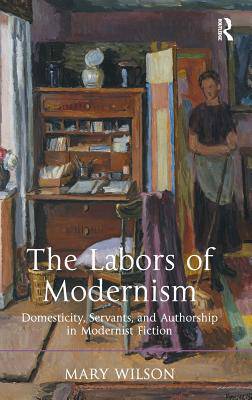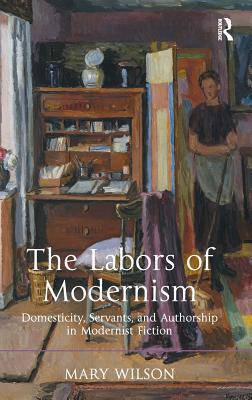
- Afhalen na 1 uur in een winkel met voorraad
- Gratis thuislevering in België vanaf € 30
- Ruim aanbod met 7 miljoen producten
- Afhalen na 1 uur in een winkel met voorraad
- Gratis thuislevering in België vanaf € 30
- Ruim aanbod met 7 miljoen producten
Zoeken
The Labors of Modernism
Domesticity, Servants, and Authorship in Modernist Fiction
Mary Wilson
Hardcover | Engels
€ 195,95
+ 391 punten
Uitvoering
Omschrijving
In The Labors of Modernism, Mary Wilson analyzes the unrecognized role of domestic servants in the experimental forms and narratives of Modernist fiction by Virginia Woolf, Gertrude Stein, Nella Larsen, and Jean Rhys. Examining issues of class, gender, and race in a transatlantic Modernist context, Wilson brings attention to the place where servants enter literature: the threshold. In tracking their movements across the architectural borders separating indoors and outdoors and across the physical doorways between rooms, Wilson illuminates the ways in which the servants who open doors symbolize larger social limits and exclusions, as well as states of consciousness. The relationship between female servants and their female employers is of particular importance in the work of female authors, for whom the home and the novel are especially interconnected sites of authorization and domestication. Modernist fiction, Wilson shows, uses domestic service to tame and interrogate not only issues of class, but also the overlapping distinctions of racial and ethnic identities. As Woolf, Stein, Larsen, and Rhys use the novel to interrogate the limitations of gendered domestic ideologies, they find they must deploy these same ideologies to manage the servant characters whose labor maintains the domestic spaces they find limiting. Thus the position of servants in these texts forces the reader to recognize servants not just as characters, but as conditions for the production of literature and of the homes in which literature is created.
Specificaties
Betrokkenen
- Auteur(s):
- Uitgeverij:
Inhoud
- Aantal bladzijden:
- 192
- Taal:
- Engels
Eigenschappen
- Productcode (EAN):
- 9781409443612
- Verschijningsdatum:
- 8/05/2013
- Uitvoering:
- Hardcover
- Formaat:
- Genaaid
- Afmetingen:
- 156 mm x 234 mm
- Gewicht:
- 449 g

Alleen bij Standaard Boekhandel
+ 391 punten op je klantenkaart van Standaard Boekhandel
Beoordelingen
We publiceren alleen reviews die voldoen aan de voorwaarden voor reviews. Bekijk onze voorwaarden voor reviews.











